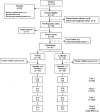Development of a Family-School Intervention for Young Children With Attention Deficit Hyperactivity Disorder
- PMID: 24353368
- PMCID: PMC3864191
Development of a Family-School Intervention for Young Children With Attention Deficit Hyperactivity Disorder
Abstract
Although numerous studies have evaluated the effectiveness of multi-modal psychosocial interventions for children with attention deficit hyperactivity disorder, these programs are limited in that there has not beeti an explicit focus on the connection between fatnily and school. This study was designed to develop and pilot test a family-school ititervention, Family-School Success-Early Elementary (FSS-EE), for kindergarten and first-grade studetits with attention deficit hyperactivity disorder. Key components of FSS-EE were family-school behavioral consultatioti, daily report cards, and strategies to improve parent-child relationships atid family involvement in educatioti. FSS-EE was developed using a multistep iterative process. The piloted version consisted of 12 weekly sessions including 6 group meetings, 4 individualized family sessions, and 2 school-based consultations. Families participating in the study were given the choice of placing their childreti on medication; 25% of children were on medication at the time of random assignmetit. Childreti (n = 61) were randomly assigned to FSS-EE or a comparison group controlling for nonspecific treatment effects. Outcomes were assessed at post interventioti and 2-month follow-up. Study findings indicated that FSS-EE was feasible to implement and acceptable to paretits atid teachers. In addition, the findings provided preliminary evidence that FSS-EE is effective in improving parenting practices, child behavior at school, and the student-teacher relationship.
Figures


Similar articles
-
A family-school intervention for children with ADHD: results of a randomized clinical trial.J Consult Clin Psychol. 2012 Aug;80(4):611-23. doi: 10.1037/a0028188. Epub 2012 Apr 16. J Consult Clin Psychol. 2012. PMID: 22506793 Free PMC article. Clinical Trial.
-
A process for developing community consensus regarding the diagnosis and management of attention-deficit/hyperactivity disorder.Pediatrics. 2005 Jan;115(1):e97-104. doi: 10.1542/peds.2004-0953. Pediatrics. 2005. PMID: 15629972
-
The Role of Parental ADHD in Sustaining the Effects of a Family-School Intervention for ADHD.J Clin Child Adolesc Psychol. 2016;45(3):305-19. doi: 10.1080/15374416.2014.963858. Epub 2014 Dec 13. J Clin Child Adolesc Psychol. 2016. PMID: 25496523 Free PMC article. Clinical Trial.
-
Beyond symptom control for attention-deficit hyperactivity disorder (ADHD): what can parents do to improve outcomes?Child Care Health Dev. 2015 Jan;41(1):1-14. doi: 10.1111/cch.12159. Epub 2014 Jun 9. Child Care Health Dev. 2015. PMID: 24910021 Review.
-
Attention deficit hyperactivity disorder in pre-school children: current findings, recommended interventions and future directions.Child Care Health Dev. 2009 Nov;35(6):754-66. doi: 10.1111/j.1365-2214.2009.00938.x. Epub 2009 Jun 8. Child Care Health Dev. 2009. PMID: 19508319 Review.
Cited by
-
Effects of behavioural parent training for children with attention-deficit/hyperactivity disorder on parenting behaviour: a protocol for an individual participant data meta-analysis.BMJ Open. 2020 Nov 27;10(11):e037749. doi: 10.1136/bmjopen-2020-037749. BMJ Open. 2020. PMID: 33247007 Free PMC article.
-
Enhanced Physical Activity Improves Selected Outcomes in Children With ADHD: Systematic Review.West J Nurs Res. 2016 Sep;38(9):1155-84. doi: 10.1177/0193945916649954. Epub 2016 May 24. West J Nurs Res. 2016. PMID: 27226208 Free PMC article.
-
Research Review: Mechanisms of change and between-family differences in parenting interventions for children with ADHD - an individual participant data meta-analysis.J Child Psychol Psychiatry. 2025 Sep;66(9):1304-1319. doi: 10.1111/jcpp.14120. Epub 2025 Feb 5. J Child Psychol Psychiatry. 2025. PMID: 39910778 Free PMC article. Review.
-
ADHD in children and adolescents: Review of current practice of non-pharmacological and behavioural management.AIMS Public Health. 2023 Feb 7;10(1):35-51. doi: 10.3934/publichealth.2023004. eCollection 2023. AIMS Public Health. 2023. PMID: 37063364 Free PMC article. Review.
-
Refining an intervention for students with emotional disturbance using qualitative parent and teacher data.Child Youth Serv Rev. 2015 Nov;58:41-49. doi: 10.1016/j.childyouth.2015.08.014. Epub 2015 Aug 24. Child Youth Serv Rev. 2015. PMID: 28966422 Free PMC article.
References
-
- Abikoff H, Hechtman L, Klein RG, Weiss G, Fleiss K, Etcovitch J, Pollack S. Symptomatic improvement in children with ADHD treated with long-term methylphenidate and multimodal psychosocial treatment. Journal of the American Academy of Child & Adolescent Psychiatry. 2004;43:802–811. doi; 10.1097/01.chi.0000128791.10014.ac. - PubMed
-
- Ambrosini PJ. Historical development and present status of the Schedule for Affective Disorders and Schizophrenia for School-Age Children (K-SADS). Journal of the American Academy of Child and Adolescent Psychiatry. 2000;39:49–58. - PubMed
-
- Bagner DM, Eyberg SM. Parent-child interaction therapy for disruptive behavior in children with mental retardation: A randomized controlled trial. Journal of Clinical Child and Adolescent Psychology. 2007;36:418–429. - PubMed
-
- Christenson SL, Reschly AL, editors. Handbook of school-family partnerships. Routledge; New York, NY: 2009.
Grants and funding
LinkOut - more resources
Full Text Sources
